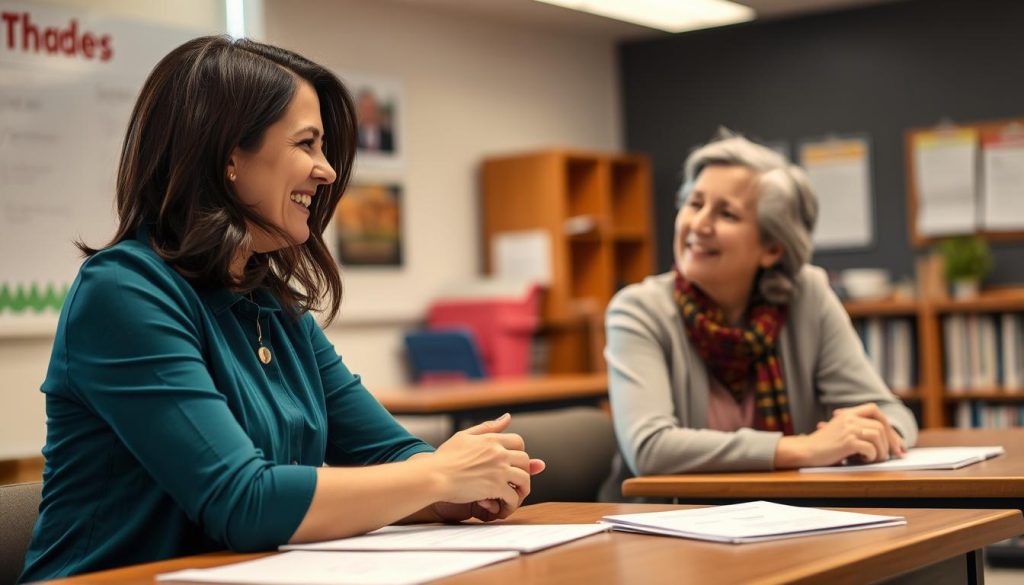Why Top Tips for Parent-Teacher Communication Matter
Effective communication creates strong school-home partnerships
Research consistently shows that strong parent-teacher relationships significantly impact student achievement. According to a Harvard Family Research Project study, students with involved parents are nearly twice as likely to succeed academically. Developing effective teacher skills in communication isn’t just helpful—it’s essential.
When teachers master communication strategies, they create a support system that extends beyond classroom walls. Parents gain insight into their child’s education, while teachers benefit from parents’ unique perspective on their students. This collaborative approach leads to better academic outcomes, improved behavior, and increased student confidence.
The top tips for parent-teacher communication we’ll explore help bridge potential gaps between school and home, creating consistency that benefits everyone involved—especially students.
Top Tips for Parent-Teacher Communication #1: Establish Early Contact
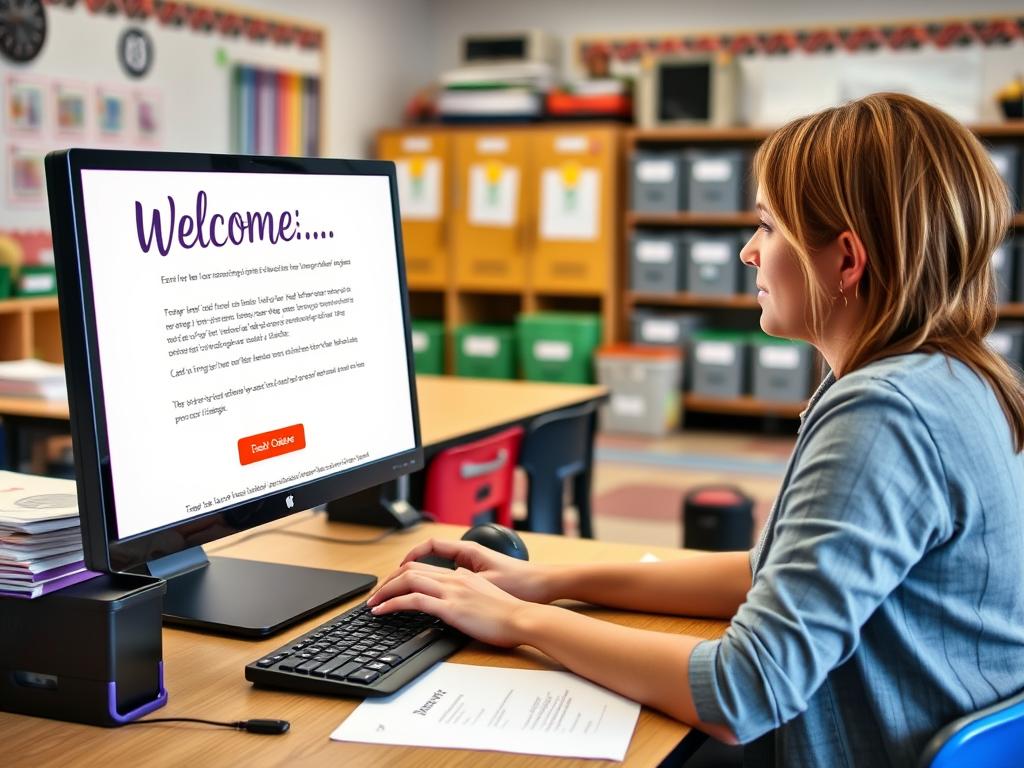
One of the most important teacher skills is initiating positive contact before problems arise. Start the school year by reaching out to every family with a friendly introduction. This proactive approach sets the tone for the entire year.
Consider these early contact strategies:
- Send a welcome email or letter introducing yourself and your teaching philosophy
- Make positive phone calls home during the first weeks of school
- Host a casual meet-and-greet event before formal conferences
- Create a classroom newsletter highlighting upcoming activities and learning goals
Early positive contact helps establish trust and shows parents you value their partnership. When you eventually need to discuss challenges, this foundation makes those conversations more productive.
Enhance Your Communication Skills
Looking to develop more effective teacher skills for connecting with families? Our specialized course provides practical strategies for building strong relationships from day one.
Top Tips for Parent-Teacher Communication #2: Offer Multiple Communication Channels
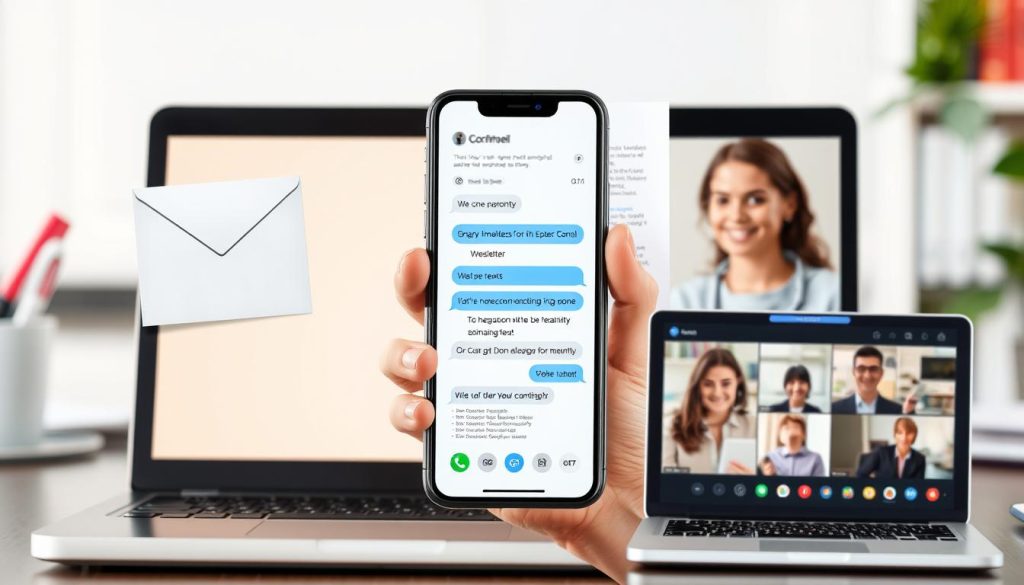
Families have diverse preferences and schedules that affect how they communicate. Developing versatile teacher skills means offering multiple channels for parent-teacher interaction. This flexibility demonstrates your commitment to reaching every family.
Consider implementing these communication options:
Digital Options
- Email updates and newsletters
- Classroom apps or websites
- Text messaging systems
- Video conferencing for virtual meetings
Traditional Options
- Phone calls for important updates
- Printed newsletters and notes
- In-person conferences and meetings
- Communication notebooks for daily updates
Early in the year, survey parents about their preferred communication methods. This simple teacher skill shows respect for their time and circumstances. Remember that some families may have limited internet access or language barriers that affect their communication preferences.
Top Tips for Parent-Teacher Communication #3: Maintain Regular, Positive Contact

Many parents only hear from teachers when there’s a problem. This creates anxiety whenever school communication arrives. Developing teacher skills that include regular positive contact transforms this dynamic completely.
Make it a goal to contact each family with positive news at least once per quarter. These “good news” communications can be brief but should be specific about what the student is doing well. For example: “I wanted to let you know that Miguel showed incredible perseverance during our math lesson today. He struggled with the new concept but kept trying different approaches until he succeeded.”
This consistent positive communication accomplishes several important goals:
- Builds trust between teachers and families
- Helps parents see their child’s strengths in the classroom
- Creates a more receptive atmosphere when challenges need to be discussed
- Demonstrates your commitment to seeing the whole child, not just problems
Consider creating a simple tracking system to ensure you’re reaching every family with positive news. This organizational teacher skill ensures no student is overlooked in your communication efforts.
Top Tips for Parent-Teacher Communication #4: Be Clear and Specific

Vague communication creates confusion and anxiety. One of the most valuable teacher skills is the ability to communicate clearly and specifically about student progress, classroom expectations, and needed actions.
When discussing student behavior or academic performance:
Instead of saying:
“Jason is having trouble in math.”
Try saying:
“Jason is struggling specifically with multi-digit multiplication. He’s doing well with the concept but makes calculation errors.”
When requesting parent support:
Instead of saying:
“Please help with homework.”
Try saying:
“Would you be able to check that Maria completes her reading log each night? She needs to read for 20 minutes and record the title and pages read.”
Clear communication is especially important when discussing sensitive topics. Developing teacher skills that include precise, objective language helps keep conversations productive and solution-focused.
Pro Tip: Avoid educational jargon when communicating with parents. Terms like “formative assessment” or “scaffolding” may be unclear to families outside the education field. Either explain these terms or use more accessible language.
Communication Timing and Frequency
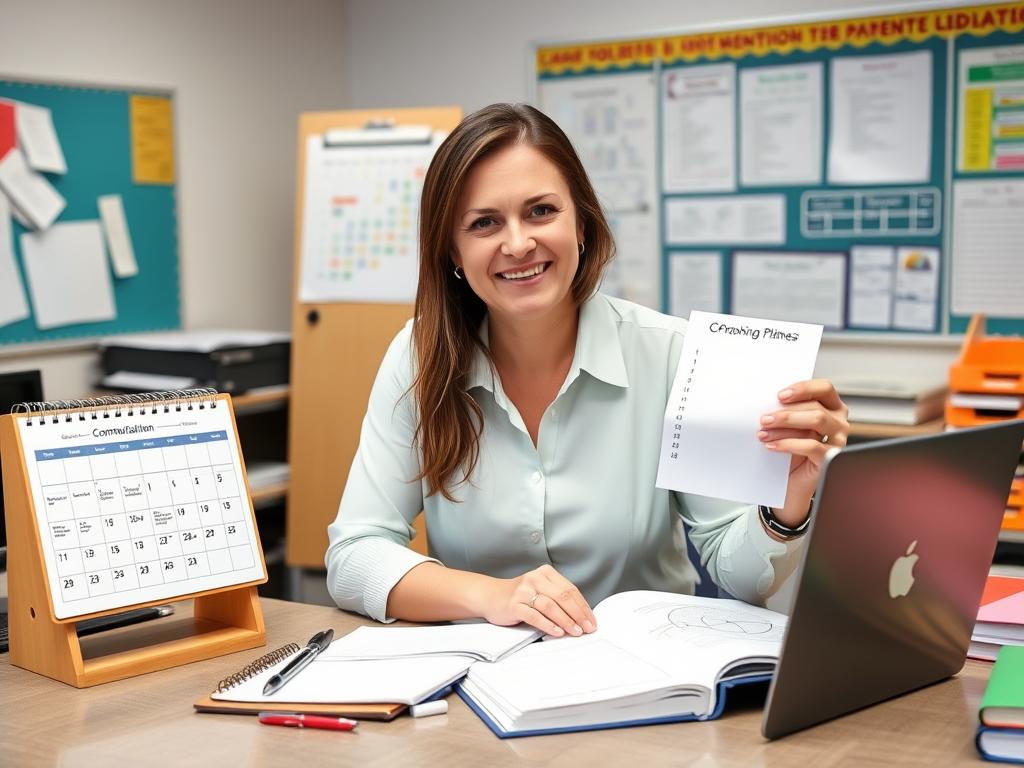
Finding the right balance in communication frequency is a crucial teacher skill. Too little communication leaves parents feeling disconnected, while too much can become overwhelming.
Consider these guidelines for timing your communications:
- Weekly updates for general classroom information (newsletter, website updates)
- Bi-weekly or monthly for individual student progress updates
- Immediate communication for significant behavioral issues or academic concerns
- 24-48 hour response time to parent inquiries
Many teachers find that consistent, predictable communication works best. For example, sending a classroom newsletter every Friday helps parents know when to expect updates. This predictability is especially important for busy families juggling multiple responsibilities.
Remember that developing strong teacher skills in communication means adapting to the needs of your specific classroom community. Some families may need more frequent contact, while others prefer less. Being flexible while maintaining clear boundaries protects both your time and the quality of your communications.
Cultural Sensitivity in Communication

Today’s classrooms serve increasingly diverse families. Developing teacher skills that include cultural sensitivity is essential for effective communication with all parents.
Consider these approaches for culturally responsive communication:
- Learn about the cultural backgrounds represented in your classroom
- Provide communications in families’ home languages whenever possible
- Be aware of cultural differences in communication styles and expectations
- Avoid assumptions about family structures or involvement
- Respect cultural perspectives on education and authority
In some cultures, parents may view questioning teachers as disrespectful, while in others, active participation is expected. Understanding these differences helps you interpret parent responses accurately and adjust your approach accordingly.
Remember that developing inclusive teacher skills means recognizing that “parent involvement” looks different across cultures. Some parents may not attend school events but show their support through emphasizing education at home, helping with homework, or making sacrifices to ensure their child attends school regularly.
“Effective teachers don’t just communicate with families; they communicate in ways that respect and honor each family’s cultural background and unique circumstances.”
– Dr. Gloria Ladson-Billings, Researcher on Culturally Relevant Pedagogy
Handling Difficult Conversations
Even with excellent teacher skills in communication, challenging conversations will arise. How you handle these moments often determines whether the parent-teacher relationship strengthens or deteriorates.
Follow these guidelines when difficult topics need to be addressed:
Before the Conversation
- Prepare specific examples and documentation
- Consider the parent’s perspective
- Plan for a private, uninterrupted meeting time
- Identify potential solutions to suggest
During the Conversation
- Start with a positive observation about the student
- Present concerns objectively without judgment
- Listen actively to parent perspectives
- Focus on collaborative problem-solving
Remember that parents may react emotionally when hearing concerns about their child. Developing teacher skills that include emotional intelligence helps you respond with empathy rather than defensiveness.
Always end difficult conversations by summarizing agreed-upon action steps and scheduling a follow-up. This demonstrates your commitment to ongoing communication and problem-solving.
Master Challenging Conversations
Want to develop advanced teacher skills for navigating difficult discussions with parents? Our specialized course provides frameworks and practice scenarios.
Leveraging Technology Effectively
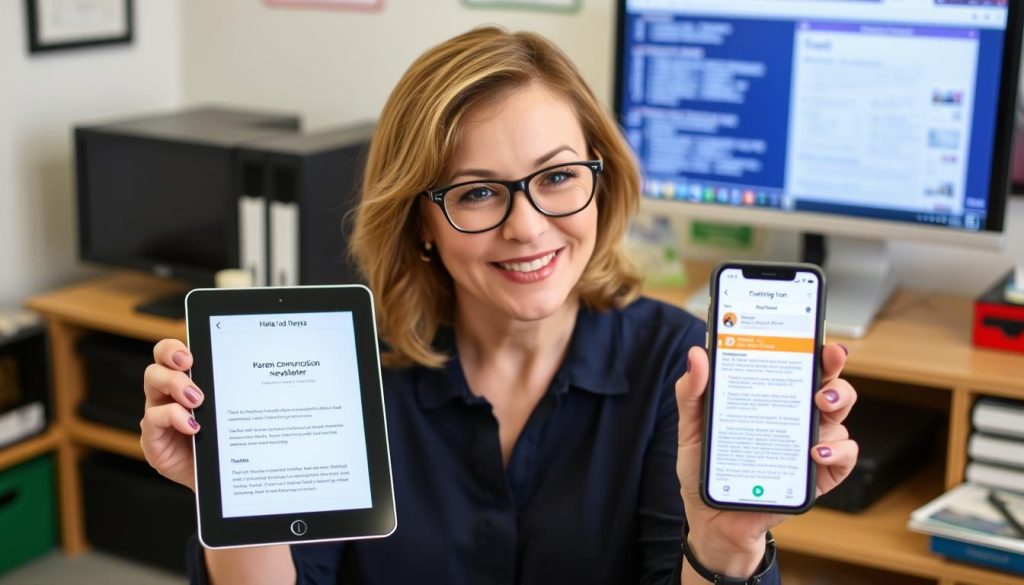
Today’s digital tools offer unprecedented opportunities for parent-teacher communication. Developing teacher skills that include technology literacy helps you leverage these tools effectively while avoiding common pitfalls.
Consider these technology-based communication strategies:
- Classroom apps that allow secure messaging and photo sharing
- Digital portfolios where parents can view student work samples
- Automated translation tools for multilingual communication
- Video conferencing for virtual parent-teacher conferences
- Scheduling tools that simplify meeting coordination
While technology offers many benefits, remember that not all families have equal access. Developing inclusive teacher skills means providing alternative communication methods for families with limited technology access.
Also consider privacy when using digital tools. Avoid sharing sensitive student information through unsecured channels, and be mindful of what student work and images you share digitally.
Building Parent Partnerships

The most effective parent-teacher relationships go beyond basic communication to true partnership. Developing teacher skills that foster collaboration creates a powerful support system for students.
Consider these approaches for building stronger partnerships:
- Ask parents about their child’s strengths, interests, and needs
- Invite parent expertise and talents into the classroom
- Provide specific ways parents can support learning at home
- Acknowledge and appreciate parent contributions
- Include parents in goal-setting and problem-solving
When parents feel valued as partners rather than just recipients of information, they become more engaged in their child’s education. This partnership approach recognizes that parents have unique insights into their children that complement your professional expertise.
Remember that developing inclusive teacher skills means creating partnership opportunities that work for diverse family situations. Offer various ways to contribute that accommodate different schedules, skills, and comfort levels.
Maintaining Professional Boundaries

While strong parent-teacher relationships are important, maintaining appropriate professional boundaries is an essential teacher skill. Clear boundaries protect your well-being while ensuring consistent, fair treatment of all families.
Consider these boundary-setting strategies:
- Establish and communicate your contact hours
- Create a professional email address used only for school communication
- Develop consistent policies for response times
- Maintain confidentiality about all students and families
- Redirect personal questions to professional topics
Setting boundaries isn’t about limiting communication—it’s about creating sustainable practices that allow you to be fully present and professional in your interactions with all families.
Remember that developing balanced teacher skills means recognizing when to seek support. For particularly challenging situations, involve administrators, counselors, or other appropriate resources rather than trying to handle everything independently.
Putting These Communication Tips Into Practice
Effective parent-teacher communication is both an art and a science. The top tips for parent-teacher communication we’ve explored provide a framework, but implementing them successfully requires practice, reflection, and ongoing adjustment to meet the needs of your specific classroom community.
Remember that developing strong teacher skills in communication is a journey, not a destination. Even experienced educators continue refining their approach as they work with different families and adapt to changing communication technologies.
By implementing these strategies consistently, you’ll build stronger partnerships with families, create a more supportive environment for your students, and experience greater satisfaction in your teaching practice.
Take Your Communication Skills to the Next Level
Ready to enhance your teacher skills and transform your parent-teacher relationships? Our comprehensive professional development courses provide research-based strategies, practical tools, and supportive guidance.
Explore Our Teacher Resources
Enroll in Our Communication Course

